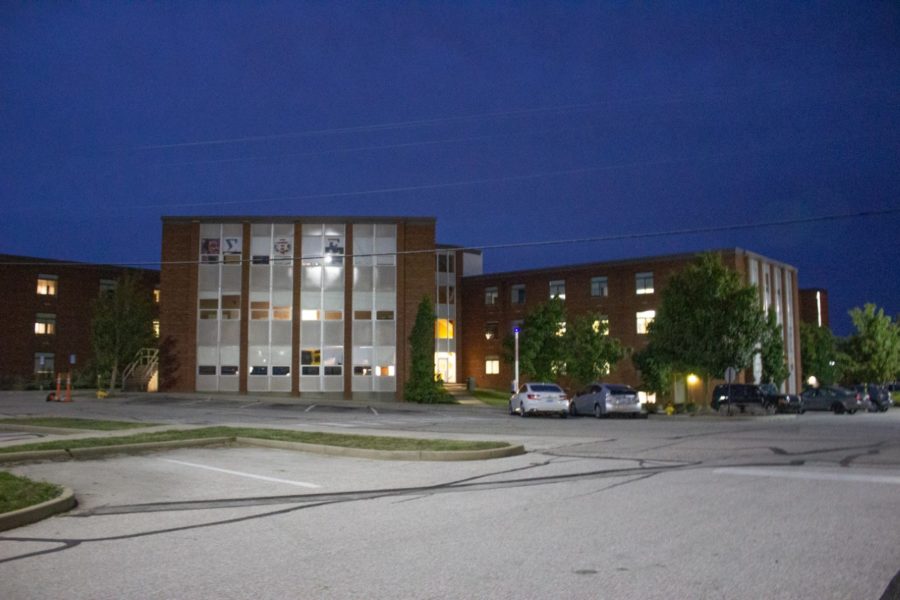
University Housing held an open dialogue Tuesday evening to field student concerns and gather feedback about the $500 winter break housing fee, which is new this year. A sparsely attended student protest was held in front of Norse Commons Wednesday afternoon in response to the fee.
The fee comes after a 5.8% increase in housing rates and an 8.5% increase in dining rate this academic year, according to the Board of Regents. While the winter break fee was acknowledged in the contracts distributed to students in the previous academic year, the fee’s exact amount was not made clear until June of 2023 when the Board of Regents approved it. Students had until July 2023 to withdraw from contracts.
The protest calling for students to stand up against the $500 fee was announced on social media starting from Oct. 20. James Renton, the primary organizer, stated that the protest aimed to completely remove the fee.
“Northern Kentucky University has not engaged in charging such a fee in the past, and as costs increase at the university the reality is that attending NKU becomes less and less affordable,” Renton wrote in an official statement. “This is unjust to those affected by financial restraints, and given the quality of dorm life on campus, it’s a gross overcharge of students.”
Just a few students gathered outside Norse Commons to protest the fee, but based on feedback Renton has received, they feel that others affected by the fee support the cause of reducing or rolling it back. While little may have been accomplished through the organized gathering, Renton plans to continue fighting the fee.
During the dialogue with the Residence Hall Association (RHA), NKU’s director for University Housing Scott Patton opened the floor to any student interested in voicing their concern to speak directly with him.
A persistent issue echoed by the nearly dozen students in attendance was that the $500 fee blindsided residential students. Patton answered that at least 10 communications had been distributed via mass email — starting Dec. 1, 2022 and intermittently sent through the spring and summer up to Oct. 28 this year — which informed students of the decision to charge a fee for those who wished to stay in the dorms over the break.
Patton said the Board of Regents approved the winter break fee on June 14. A correspondence was relayed two days later on June 16 that gave a two-week window for students to cancel their University Housing contract without any financial penalty.
Much of the student response was the same: a few looked back through their emails and were unable to find many of the aforementioned announcements. One student pointed out that it was insufficient to only send this information over email as many students still had no idea about any fee up until Sept. 22.
Attendees emphasized that the flow of information from university leadership to students was inadequate and hastily communicated. Another student mentioned a common belief that the price was going to be around $100 to $250.
With regard to how the figure of $500 was procured, Patton explained that semester bills for on-campus housing are calculated based on amounts approved by the board, plus a daily rate multiplied by the number of days a student stays on campus in a semester. He said that using the daily rate method to calculate the winter break fee amount would have cost students about $550 for the cheapest housing option, while the most expensive option would come up to about $700. The eventual figure of $500 is more affordable than charges otherwise based on the daily rates, he added.
In the end, no single individual was wholly responsible for making decisions on the fee, Patton said. However, he admitted responsibility for the decision as housing director, regardless of who made it in the first place.
The impact of the fee on international and financially insecure students was emphasized after the fee explanation. Patton acknowledged personal situations students might face — family issues, medical expenses — that could cause them significant stress. He encouraged students to discuss their financial challenges with University Housing so that housing staff could help them figure out a solution.
As for international residents, Patton said that they have to provide proof of their financial capabilities before coming to the United States. Should the $500 fee cause problems for international students, he again encouraged them to work with housing staff.
Following that, a student brought up a figure of 300 students who they believe would require assistance to stay in the dorms over the break. The student then asked if it would be more applicable for housing to compromise with all students instead of having to meet with each individual. If that was the case, Patton said, then it was the office’s job to meet that need.
Students also raised concern about the indiscriminate nature of the fee: whether they plan to stay over winter break for a day, two weeks or the entire month, residents would have to pay $500 all the same.
Dining will be closed and the NKU shuttle will stop running over the course of winter break. Responding to a question about what food options resident students might have, Patton did not provide detailed solutions aside from the Callahan Bistro robotic servers.
The dialogue with the housing director concluded with many lingering questions about the effects of the winter break fee.

